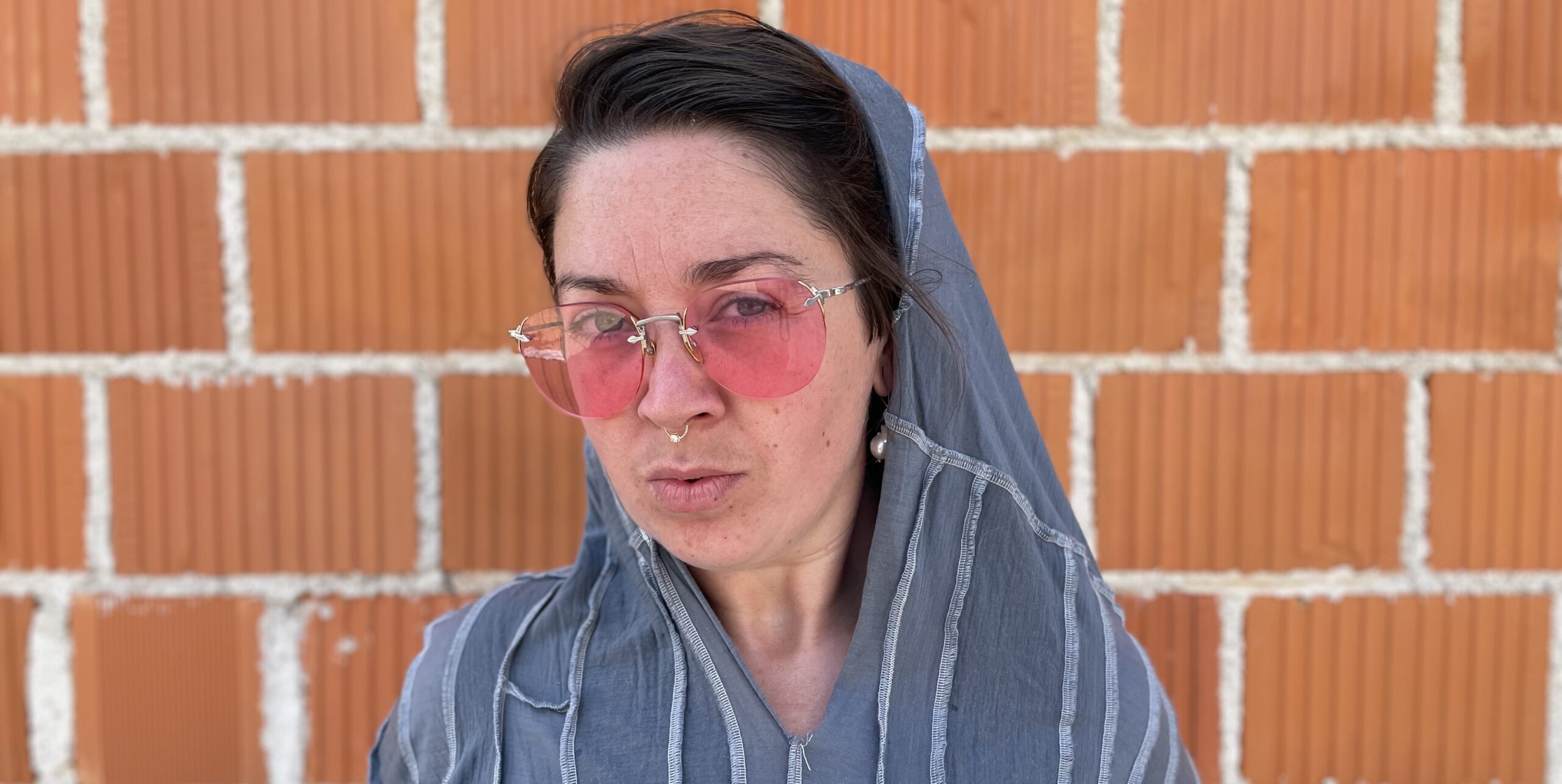
fotocredit : Ondřej Merta
I am East European female artist.
I work in the field of expanded sculptures.
I create works, installations, and situations
that serve as communication tools, not as means of communication. My work tends to use personal experiences, mistakes, and openness as a strategy for connecting, but also to let objects tell their own stories through their purpose, origin, aesthetics, and degree of damage or potential. Through their positions, objects build relationships and contexts, becoming not only cultural or natural products, but actors themselves within the limits of our thinking. Actors, but not according to the tenets of radical materialism. I distance myself from thinking
that attributes guilt to objects. In my work with materials and objects, I am interested in the relationship between culture and nature in metaphors and general questions of the existence of the individual/society.
I describe the tension between the fragility of existence and the power of faith.
born *1987 in Brno / Czechoslovakia
based in Skuteč in The Czech Republic
**Johana Merta: O rovnováze, která nikdy nebyla**
Johana Merta (*1987, Brno) patří mezi autorky, které ve své generaci nacházejí nové formy pro existenci výtvarného umění po ztrátě jeho samozřejmé autonomie. Její práce, ať už se jedná o instalace, environmenty nebo drobné objekty, nevznikají z potřeby reprezentovat svět, nýbrž z úsilí s ním být – materiálně, situačně, v pohybu a v nejistotě. Merta přitom vychází z tradice intermediálního myšlení, jak se vyvíjelo na brněnské FaVU, kde prošla ateliéry Performance, Intermédií, Kresby a grafiky. V tomto kontextu lze její tvorbu číst jako promyšlenou reakci na otázku, zda je dnes ještě možné hovořit o umění jako o místě poznání.
Merta se v posledních letech soustředí na vztah mezi kulturou a přírodou, nikoli však v naivní ekologické rovině, ale jako na konflikt paradigmat, z něhož se rodí současná zkušenost. V projektech jako *You Cannot Google Faith* (2019) či *Over All Possibilities 2* (2025) se ukazuje, že rovnováha je vždy také otázkou víry – důvěry v materiál, v dialog, v možnost sdíleného prostoru. Umělkyně vytváří situace, které nenabízejí hotové významy, ale zprostředkovávají možnost vztahu. V tom je její práce aktuální a hluboce politická: ne proto, že by přímo tematizovala mocenské struktury, nýbrž proto, že umožňuje prožít situaci, v níž se moc přestává jevit jako abstrakce a začíná být prožívána v hmotě a v čase.
V jejích instalacích se opakovaně objevuje téma rovnováhy – nikoli jako ideálu či stavu, ale jako procesu, který je neustále narušován, obnovován a zpochybňován. Práce s hmotou, gravitací a materiální pamětí zde získává význam, jenž přesahuje fyzikální rovinu: stává se metaforou křehké koexistence, kterou sdílíme s věcmi, krajinou i sami se sebou. Objekty nejsou pouhými artefakty; nesou stopy předchozího použití, ekonomických i emocionálních vztahů, které nás přesahují.
Mertina pozice v současném umění je pozoruhodná: nevytváří spektakulární obrazy, nýbrž drobné, často křehké konfigurace, které vyžadují trpělivost, naslouchání a ochotu být v nejistotě. Její práce ukazuje, že estetika se dnes nemůže oddělit od etiky ani od ekologie. V jejím pojetí je umění spíše způsobem, jak přebývat ve světě – a to s vědomím, že rovnováha, kterou hledáme, nikdy nebyla daná, ale vždy znovu vzniká v pohybu mezi námi a věcmi.
Ondřej Merta 7.11.2025
Johana Merta: On Balance That Never Was
Johana Merta (*1987, Brno) is one of a generation of artists who are finding new forms for the existence of visual art after the loss of its self-evident autonomy. Her work, whether installations, environments, or small objects, does not arise from a need to represent the world, but rather from an effort to be with it—materially, situationally, in motion, and in uncertainty. Merta draws on the tradition of intermedia thinking as developed at the Faculty of Fine Arts in Brno, where she studied in the studios of Performance, Intermedia, Drawing, and Graphic Arts. In this context, her work can be read as a thoughtful response to the question of whether it is still possible today to speak of art as a place of knowledge.
In recent years, Merta has focused on the relationship between culture and nature, not on a naive ecological level, but as a conflict of paradigms from which contemporary experience is born. Projects such as You Cannot Google Faith (2019) and Over All Possibilities 2 (2025) show that balance is always also a question of faith—trust in material, in dialogue, in the possibility of shared space. The artist creates situations that do not offer ready-made meanings, but mediate the possibility of relationship. This is what makes her work topical and deeply political: not because it directly addresses power structures, but because it allows us to experience a situation in which power ceases to appear as an abstraction and begins to be experienced in matter and time.
The theme of balance repeatedly appears in her installations—not as an ideal or a state, but as a process that is constantly disrupted, renewed, and questioned. Working with matter, gravity, and material memory takes on a meaning that transcends the physical plane: it becomes a metaphor for the fragile coexistence we share with things, the landscape, and ourselves. Objects are not mere artifacts; they bear traces of previous use, economic and emotional relationships that transcend us.
Mertina’s position in contemporary art is remarkable: she does not create spectacular images, but rather small, often fragile configurations that require patience, listening, and a willingness to be in uncertainty. Her work shows that aesthetics today cannot be separated from ethics or ecology. In her conception, art is rather a way of dwelling in the world—with the awareness that the balance we seek has never been given, but is always re-emerging in the movement between us and things.
Ondřej Merta 11/7/2025